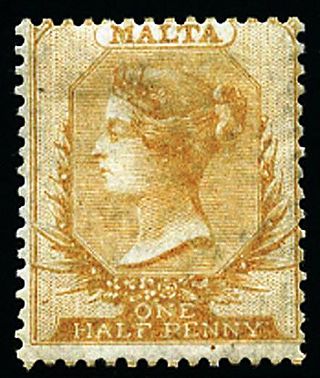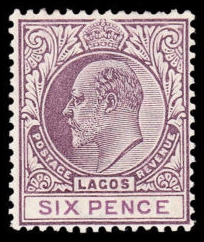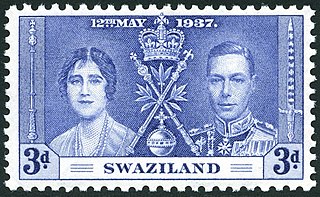
This is a survey of the postage stamps and postal history of the Niger Territories, an area between the Forcados and Brasse Rivers, once administered by the Royal Niger Company but now part of modern Nigeria.

This is a survey of the postage stamps and postal history of the Niger Territories, an area between the Forcados and Brasse Rivers, once administered by the Royal Niger Company but now part of modern Nigeria.
The first stamps used in the Niger Territories were British stamps from 1890. [1] The Niger Territories never issued stamps, they only used British stamps which can be identified by their distinctive postmarks. The postmarks were inscribed "THE NIGER TERRITORIES POST OFFICE" or "THE ROYAL NIGER COMPANY CHARTERED & LIMITED", and with the name of the post office underneath. The post offices were:
From 1 January 1900, the territories were transferred to the control of the British government to form the Southern Nigeria Protectorate. [1]

A first day of issue cover or first day cover (FDC) is a postage stamp on a cover, postal card or stamped envelope franked on the first day the issue is authorized for use within the country or territory of the stamp-issuing authority. Sometimes the issue is made from a temporary or permanent foreign or overseas office. Covers that are postmarked at sea or their next port of call will carry a Paquebot postmark. There will usually be a first day of issue postmark, frequently a pictorial cancellation, indicating the city and date where the item was first issued, and "first day of issue" is often used to refer to this postmark. Depending on the policy of the nation issuing the stamp, official first day postmarks may sometimes be applied to covers weeks or months after the date indicated.
This is a survey of the postage stamps and postal history of British East Africa.

This is a survey of the postage stamps and postal history of Zululand under British rule.

The British Central Africa Protectorate existed in the area of present-day Malawi between 1891 and 1907.

The Royal Niger Company was a mercantile company chartered by the British government in the nineteenth century. It was formed in 1879 as the United African Company and renamed to National African Company in 1881 and to Royal Niger Company in 1886. In 1929, the company became part of the United Africa Company, which came under the control of Unilever during the 1930s and continued to exist as a subsidiary of Unilever until 1987, when it was absorbed into the parent company.
This is a survey of the postage stamps and postal history of the Niger Coast Protectorate.

The British post offices in China were a system of post offices set up by the United Kingdom in various treaty ports of China in the late 19th and early 20th centuries.

Aden is a city in southern Yemen. Aden's location made it a popular exchange port for mail passing between places around the Indian Ocean and Europe. When Captain S. B. Haines of the Indian Marine, the East India Company's navy, occupied Aden on 19 January 1839, mail services were immediately established in the settlement with a complement of two postal clerks and four letter carriers. An interim postmaster was appointed as early as June 1839. Mail is known to exist from 15 June 1839 although a regular postmaster was not appointed until 1857; one of the officials of the Political Agent or the civil surgeon performed the duties of postmaster for a small salary.

The postal history of Malta began in the early modern period, when pre-adhesive mail was delivered to foreign destinations by privately owned ships for a fee. The earliest known letter from Malta, sent during the rule of the Order of St John, is dated 1532. The first formal postal service on the islands was established by the Order in 1708, with the post office being located at the Casa del Commun Tesoro in Valletta. The first postal markings on mail appeared later on in the 18th century.

This is a survey of the postage stamps and postal history of the Southern Nigeria Protectorate.

Edward Wilfrid Baxby (Ted) Proud was a British postal historian, philatelic writer, and philatelic dealer who signed the Roll of Distinguished Philatelists in 2008.
This is a survey of the postage stamps and postal history of Nigeria.

This is a survey of the postage stamps and postal history of Lagos, now part of modern Nigeria.

This is a survey of the postage stamps and postal history of Zimbabwe.

This is a survey of the postage stamps and postal history of Kenya.

The postal history of the British Cameroons falls into two essential parts: the occupation of German Kamerun by Anglo-French forces in 1915, when German Colonial stamps were issued with an overprint and surcharge; and the situation following a 1961 plebiscite, after which the former British Cameroons, today known as Ambazonia, was divided between Cameroon and Nigeria.

The Mosely Collection of British Africa stamps dating to 1935 was formed by Dr Edward Mosely of Johannesburg, South Africa. The collection was donated to the British Museum by his daughter, Kathleen Cunningham, in 1946 and is now held as part of the British Library Philatelic Collections. After the Tapling Collection, this is considered the Library's most important philatelic acquisition due to the number of countries represented and the number of unique items included.

This is a survey of the postage stamps and postal history of Eswatini, formerly Swaziland.
British post offices in Crete provided the postal service in the territory of the island of Crete. Stamps inscribed in Greek were used in the British sphere of administration (Heraklion) during the Great Powers occupation of the island in 1898–1899.
Few revenue stamps of Nigeria and its predecessor states have been issued, since most of the time dual-purpose postage and revenue stamps were used for fiscal purposes. The first revenue-only stamps were consular stamps of the Niger Coast Protectorate and the Southern Nigeria Protectorate, which were created by overprinting postage stamps in 1898 and 1902 respectively. The Northern Nigeria Protectorate did not issue any specific revenue stamps, but a £25 stamp of 1904 could not be used for postal purposes due to its extremely high face value.